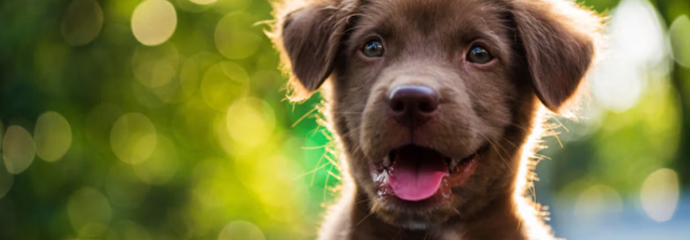Dogs

How Long to Feed Puppy Food & When to Switch to Adult Dog Food
You should feed puppy food until your puppy reaches maturity. Once he has reached maturity, you can switch to adult dog food.
Not all breeds reach maturity at the same age, however, so this can make it harder to know when to switch.
How Long to Feed Puppy Food
Puppies need a complete and balanced puppy food until they reach maturity. Although dogs who are one year or older are often considered adults, this isn’t always the case.
For dogs, adulthood depends more on breed size than their age. Because large and giant breeds take longer to mature, they need to eat puppy food longer than small- or medium-sized breeds.
Here’s how long to feed puppy food based on breed sizes:
- Toy and Small Breed Dogs: Many toy and small breed dogs weigh less than 20 pounds at maturity and reach this size between 9 and 10 months of age.
- Medium Dog Breeds: Medium-sized dogs weigh between 21 and 50 pounds at maturity. They tend to reach maturity around 12 months of age.
- Large & Giant Breeds: Large breeds and giant breeds weigh between 50 and 100 pounds, respectively, and can take 18 months to 2 full years to reach maturity. They need to eat puppy food longer than small- and medium-sized breeds.
If you have a mixed breed dog or aren’t sure how big your dog will be at maturity, it’s best to consult with your veterinarian. They can tell you when to switch to an adult dog food and help make it a successful transition.
“As puppies get older and reach maturity, it is important to monitor their food consumption. Leftovers in a bowl could signal that your puppy is getting full and needs less calories throughout the day. Start by offering less food per feeding and continue to monitor his body condition,” says Purina Nutritionist Karina Carbo-Johnson, MS.
Why Adult Dog Food Is Important
Puppy food is nutrient rich and high in calories to support your puppy’s growth, development and high energy levels.
Continuing to feed puppy food past the point of maturity could cause him to become overweight, which can lead to other health problems.
Choose a complete and balanced adult dog food formula once your puppy reaches maturity to help him maintain his ideal body condition.
When to Switch Puppy to Adult Food
Once you know when your puppy will reach maturity, you can decide when to switch to adult food.
If your puppy will be full grown at 12 months, you can start transitioning him to an adult formula around his first birthday. It can take 7 to 10 days to make the switch, so you’ll want to plan for that before you start.
How to Transition Puppy to an Adult Dog Food
When you stop feeding puppy food, you must change more than just the food he eats. The number of meals and portion sizes will shift, too.
Most puppies eat three meals a day, but adult dogs can eat just two meals per day. The feeding guide on your dog’s food label will tell you how much to feed your dog each day and to split the amount into two meals.
When it’s time to transition your puppy to an adult dog food, do so gradually. A gradual transition helps prevent stomach upset.
Here’s a sample transitional feeding plan:
- Days 1 to 2: Feed 3/4 of the normal amount of puppy food and add 1/4 adult dog food.
- Days 3 to 4: Serve half puppy food and half adult dog food.
- Days 5 to 7: Feed 1/4 puppy food and 3/4 adult dog food.
- Days 8 to 10: Serve only adult dog food.
If your dog resists eating the adult food or experiences an upset stomach, extend the transition time as needed. Consult with your veterinarian for more help if needed.
For more information and tips on puppy and dog nutrition from our experts, visit our Pet Expertise page.
